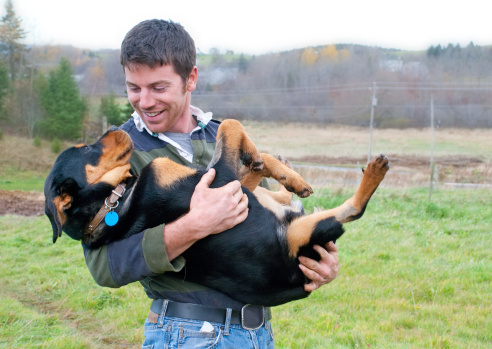 Dogs have long been known for their ability to have healing effects on the sick, but did you know that adopting a dog while going through the divorce process can provide another wonderful form of therapy? Whether getting a new puppy or adopting a dog, there is value in adding a furry companion to your life. Man’s (or woman’s) best friend alleviates that empty feeling you may now be experiencing when you walk in the door at night.
Divorce often time leaves you feeling unwanted, just like many of those dogs at the shelter, which makes that canine even more relatable. Perhaps that dog came to the shelter from a divorced family herself. It has been proven that people benefit from interacting with canines. Simply petting a dog can decrease levels of stress hormones, regulate breathing, and lower blood pressure. Research also has shown that petting releases oxytocin, a hormone associated with bonding and affection, in both the dog and the human. Dogs respond to human emotions, and seem to know just when their companion needs a little extra loving.
A dog, or other animal, can also be helpful for children coping with a divorce. Research shows that a dog can be therapeutic for a child experiencing a divorce crisis. A pet teaches a lot about coping skills, at a time when their parents may not coping very well. Cuddling up to a dog or other critter can be calming, and teaching a dog a new trick can be rewarding.
If you are looking for a constant companion, who will help reduce your stress levels (and won’t talk back!), adding a new furry friend to your home may be a good divorce healing solution for you.
Dogs have long been known for their ability to have healing effects on the sick, but did you know that adopting a dog while going through the divorce process can provide another wonderful form of therapy? Whether getting a new puppy or adopting a dog, there is value in adding a furry companion to your life. Man’s (or woman’s) best friend alleviates that empty feeling you may now be experiencing when you walk in the door at night.
Divorce often time leaves you feeling unwanted, just like many of those dogs at the shelter, which makes that canine even more relatable. Perhaps that dog came to the shelter from a divorced family herself. It has been proven that people benefit from interacting with canines. Simply petting a dog can decrease levels of stress hormones, regulate breathing, and lower blood pressure. Research also has shown that petting releases oxytocin, a hormone associated with bonding and affection, in both the dog and the human. Dogs respond to human emotions, and seem to know just when their companion needs a little extra loving.
A dog, or other animal, can also be helpful for children coping with a divorce. Research shows that a dog can be therapeutic for a child experiencing a divorce crisis. A pet teaches a lot about coping skills, at a time when their parents may not coping very well. Cuddling up to a dog or other critter can be calming, and teaching a dog a new trick can be rewarding.
If you are looking for a constant companion, who will help reduce your stress levels (and won’t talk back!), adding a new furry friend to your home may be a good divorce healing solution for you.
Two Paths, One Decision: The Divorce Dilemma
Emily and Daniel were in love. Their love story had once been the envy of the neighborhood—a whirlwind romance that blossomed into a marriage filled with laughter, shared dreams, and whispered secrets. But as the years went by, cracks appeared in their fairy tale....



